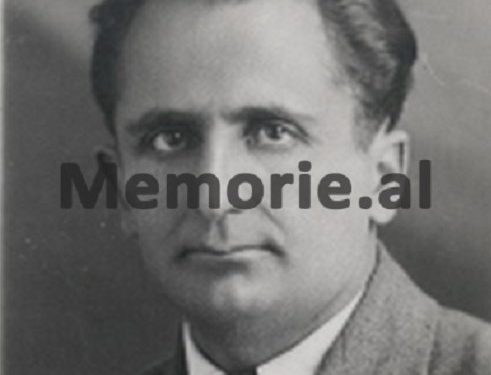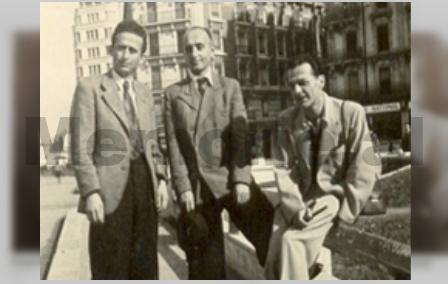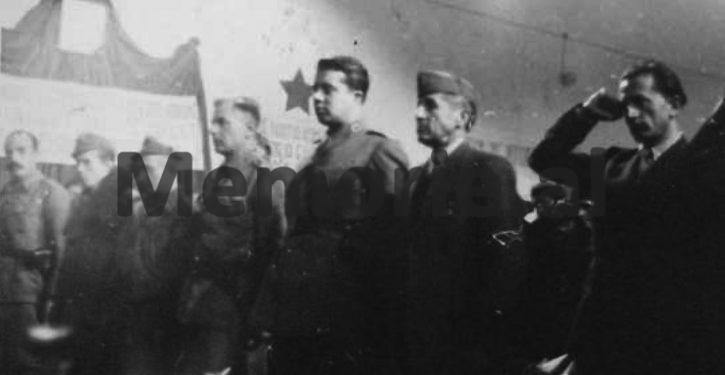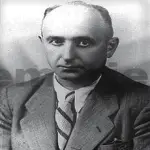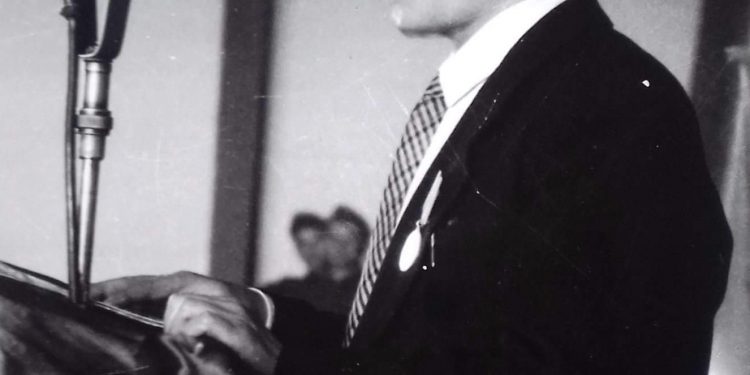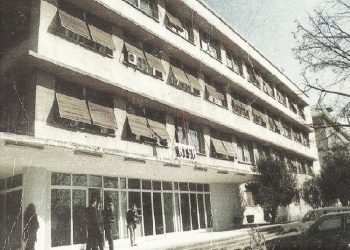By Luan Chipi
Memorie.al / I enjoyed the poet Sejfulla Malëshova, following him in the vicissitudes of his life, which seemed so interesting, special, unfortunate, painful and even tragic to me, that I thought to search and get to know him even more with him. Sejfulla Malëshova was born on March 2, 1900, in the village of Malëshovë in Përmet, where his family originated from. After finishing primary school in his hometown, he went to Italy and attended the Arbëresh College of Calabria in Saint-Mitre Korona, where De Rada, Luigj Gurakuqi and other prominent compatriots had previously studied. After finishing the College and the three years for medicine in Rome, he returned to Albania and became involved in the patriotic revolutionary organization “Bashkimi”, which Avni Rustemi had founded. Like many other young people of this time, Sejfullai also participated in the popular anti-Zogist movement, which is known as the “June Revolution of 1924”.
After the triumph of the “Fanolists”, Sejfulla Malëshova, for about six months worked in the Government Cabinet, as the secretary of Prime Minister Fan Noli. After Zog’s return to power, with the help of Serbian and Wrangelist forces, in December 1924, Sejfullai left Albania with the Fanolis. At first he settled in Italy and then in Vienna, Austria, being actively involved in the leftist revolutionary movements of the time. In 1926, with the help of KONARE, commissioned by Fan Noli, he, together with other outstanding young men of the time, such as Ali Kelmendi, Koço Tashko, Zai Fundo, Tajar Zavalani and Halim Xhelo, received a state scholarship from the Soviet Government and Sejfullai for five years, continued his studies at the Faculty of Philosophy in Moscow.
After completing five years of studies, in 1931, he was elected head of the association of Albanian students living in the Soviet Union. From 1931 to 1941, Sejfullai, endowed with a wide culture and who knew 8 foreign languages well, worked at the COMINTERN, as well as a lecturer and even dean at the Faculty of “Lomonosov” University in Moscow.
He got married in the Soviet Union. It was the year 1932, when he tried to create a family, connecting with a communist from Moscow, but due to significant differences of opinion, that marriage did not even last three months. After her, devoted to the revolution and communism, he decided never to marry again. “I don’t want to start a family anymore – he declared to one of his friends, – because I am a hot-headed and impulsive revolutionary.”
In the Soviet Union, he was accepted into the Bolshevik Party. It was the year 1932, when in an extended discussion that the basic organization had undertaken, about the problem of the party’s internal activity; he openly and clearly showed his opposition. He not only opposed it, but being convinced of the truth of his idea, (as was its permanent nature), he persevered vigorously to defend it. This led to his expulsion from the party. After that, he was expelled from Moscow and sent as an ordinary worker to a mechanical factory in the North Caucasus. But even in that case, a strange phenomenon happened, which would immediately change his life, which had taken his turn. In the summer of 1933, when Sejfullai had been working in the Caucasus for almost a year, another meeting was held in the Political Bureau of the Central Committee of the Communist Party of the Soviet Union, directed by Stalin.
The agenda of that meeting was to discuss exactly the setting of the internal rules of the party’s operation. Coincidentally, it was these views of Stalin’s that caused Sejfullain to be expelled from the party. Stalin had specifically ordered that: “All those communists, who have not been and do not agree with the mentioned principles, have deliberate ideas against the path of our party. Those who support us are with us, others are our enemies”. That was enough for the entire organization, which a year ago had expelled Sejfulla Malëshova, to be completely dissolved as a party organization and Sejfullai to be immediately evaluated and rehabilitated, then to be specially evaluated and honored. For him, this meant returning to Moscow and having the opportunity to practice his profession as a teacher.
As soon as he returned to Moscow, in 1933, where he had been a student three years earlier, the dean of the Faculty of Philosophy of “Lomonosov” University, who had also been his teacher, died. After a month, he competed for the position of lecturer, which he won easily, ranking first among 100 candidates.
During that period, also thanks to the foreign languages he possessed, he was sent by the COMINTERN with various tasks in several countries of the world. Sejfulla Malëshova, for her superior Marxist-Leninist theoretical knowledge, in 1934 was accepted as a representative member of the Comintern and with this task was sent as an active delegate to Albania and became directly part of the National-Liberation General Council, and then in leadership positions of the Party and of the State in post-war Albania. After a long emigration, after staying in France for about two years, Sejfullai came to Albania in March 1943.
He stayed for some time in Tirana as an illegal and finally left the capital, when he participated in the First Conference of the Communist Party of Albania held in Labinot, Elbasan, where he was elected a candidate of the Central Committee. When the German Winter Operation began, he remained a partisan in the mountains, next to Enver Hoxha and the General Staff, until the end of the War. In October 1944, in Berat, he was elected to the first Provisional Government headed by Enver Hoxha, taking the post of Minister of Culture and Press.
Meanwhile, immediately after the liberation, in 1945, the First President of the League of Writers and Artists of Albania will be elected. This year, his poetic volume “Poems” will be published, under the literary pseudonym “Lame Kodra”.
Sejfulla Malëshova, polyglot and very advanced in knowledge about her country, also hot-tempered, often in a hurry, and unrestrained and direct, created disagreements and misunderstandings with her friends and sometimes even rivalry and jealousy, even with the main party and state leaders . Soon he came out openly and directly attacked the main leader of the Communist Party and the National Liberation Front at the meeting of the second plenum of the Central Committee of the KPSH, which met in Berat, he declared openly and without fear that: “Enver Hoxha, although he is considered as the example of our successes of LANÇ and KPSH, it is actually the synthesis of their mistakes”. And below he would continue with his proverbial courage: “Sectarianism, not only in the Party, but also in the army, gradually degenerated into terror and it is not at all strange how this terror degraded into crime, even into crime organized”.
Sejfullai even, even two years later, when he would be expelled from the Political Bureau of the Central Committee, declared that; “If we continued this way, we will quickly turn into a clique, even a clique of murderers.” In foreign policy, Sejfulla Malëshova was for equal distance between the Soviet Union, America and England, for which she was branded as an opportunist by Enver Hoxha, as she brought the three great allies together in one plan. In domestic politics, Malëshova sought support for the development of the private market. And that was enough to be accused of being a liberal. Sejfulla Malëshova, according to the memories of his friend of the ideal and with the same cultural integrity, Dr. Ymer Dishnica was not only very knowledgeable, but also very determined and principled, who had foreseen everything, but never tolerated. For example, he had once said to him, in privacy: “I did well not to marry, Ymer, because this situation that is being created for me, would take my children as well.” The peaceful Sejfullai did not want to create victims.
The great difficulties that the people had, for the medicines that had to be found, for the problems of the people, because it is known that the beginning, in any kind of work, is difficult. Even he, who had experienced the comfortable life, was often faced with life’s difficulties, but without claims for privileges. Sejfullai often repeated the words of American President Wilson, said in 1913: “We must destroy everything that bears the small seal of privilege.” When discussing Schopenhauer’s “Metaphysics of Love”, he said: “The great man did not seek his own thing, he did not experience for himself, but for everyone…! Genius stands in contradiction, in conflict with its time…”! “Sejfullai,” his war friend says nostalgically, “was erudite and had a memory to be envied.” When we rarely met in Berat, for long hours, we had warm conversations…! I remember that we used to say that; great people (and we quoted Hugo, Chekhov) were indifferent to the praise of their works, but we were aware that man in life needs appreciation and encouragement, just as he needs food and air.
He was for slow, but sure steps. On this topic, Sejfullai told me: “The elders of my village often tell me that if you fall from the horse’s back, it goes forward, if you fall from its head, it goes backwards.” Sejfullai was open and unreservedly critical of his friends. He often quoted Bjelinski who had said: “To tell the truth first, you need nobility and courage.” And the courage to the point of self-denial was not lacking in the respected professor of philosophy, who had sacrificed the chair of the University of Moscow, to fight for his enslaved and poor people. He openly criticized everyone and perhaps he rightly alluded and aimed, even the position of the chairman of the Party, when he proposed to create that post, alongside the General Secretary, which would leave Enver Hoxha in the shade. Instead of the collegial leadership of the Albanian Communist Party, taking into consideration the remarks made by him, influenced by Tito’s envoys, who had a lot of influence at that time, punished him, condemning the “prominent theoretician” , with total neutralization and avoidance.
In 1946, due to numerous ongoing disagreements with Enver Hoxha, especially in the fields of the economy, culture and direction of the Party, he was expelled from the Party and dismissed from all functions. After that, for ten consecutive years, he worked as an economist at the National Bank in Tirana and in 1956; he was interned in Ballsh, where he was allowed to live in an old shack. During this time, (in 1949) Malëshova was also excluded from the Association of Writers and Artists, being described as; “anti-party element”. After some time from going to Ballsh, he was allowed to live in the city of Fier, working as a leather storekeeper, in an Agricultural Enterprise. People often ask why he didn’t shoot him, or why he didn’t imprison Enver Hoxha, Sejfulla Malëshova, when he didn’t spare other lesser-known figures with less weight. The answer is simple: Sejfullai was not a man of active action and Enver Hoxha did not see any danger from him.
As a man of letters and theoretician, Sejfulla Malëshova was meditative, closed in himself, without friends, without company, lonely. In Ballsh, the storekeeper Malëshova, where he was interned for several years, (then he was transferred to Fier), twice a day, morning and evening, was obliged to appear at the counter of the Fier Internal Branch, to prove that he was there. The curious saw the professor, passing in front of the police officer of the Interior Branch, waving to him with an unchanging ritual, I’m here! During the de-escalation period, during Khrushchev’s time, the professor was asked to translate Chekhov’s play from the original; “Cherry garden”. He translated it, but when it was published and he didn’t see his name in the book, as was the rule, he protested. His complaint was ignored. Although he always had pressing needs to compensate for his ridiculous salary as a storekeeper, he refused to translate anonymously, staying true to his ideals and protecting his personality.
If you looked at him closely, Sejfulla Malëshova was a seemingly ordinary man, dressed in sportswear, a republic hat or a cap, and who moved alone, disconnected from society, mostly on a bicycle. Sejfullai lived all alone, until he died in deep misery, on June 9, 1970, and his funeral was attended only by his sister who came from the village, as well as his two nephews. In 1993, a group of intellectuals took care of the reburial and missing ceremony for the translator of the International, Goethe and Nekrasov, or the rebel poet, as he liked to call himself. Sejfulla Malëshova is also a powerful voice of Albanian literature between the two wars, the voice of that literature that was known as engaged literature, distinguished poet of the anti-fascist and anti-zog movement. His poetry is poetry engaged with political, revolutionary themes. It addresses the Albanian peasantry in the first place, calls for uprising, for revolution, to overthrow the obscurantist and fascist regime.
An undisputed treasure of values are his poems, which seem to me to be momentary explosions of his talent and sporadic poetic passion: His first book of poems, which has left an indelible memory in my memory, “Stanin e Trebeshina”, in poetry, “How do I love Albania?”, in the first volume and the only book of poetry in Albanian, published by him in 1945 with “poems”, where there are 21 poems. There are other lonely poems, published in exile in “Dielli”, “Liria Kombëtare”, etc. There are also his translations from Nekrasov’s poem, “Poet and Citizen”, etc., also summarized by Nasho Jorgaqi, in “Anthology of Albanian Poetics”, beautiful translations of Goethe, Gorky, etc. His first known literary work is a poem published in Italian with the title “Kostandini”, published in Rome in 1923. This is where I believe Sejfulla Malëshova’s literary creativity begins. It is also known that a student in Italy, together with Odhise Paskali, published the magazine “Albanian Student”, where Malëshova’s first poems and translations were published. He translated and published, for example, a well-known revolutionary poem by Haines, “Puntoret e avlmendi”, about which he said that; was one of Karl Marx’s few favorite poems.
He translated Eugjen Potje’s “International”, the hymn of the international communist movement, which is also one of his best translations. There are two felt variants of “Internationals”, one from Malëshova and another from Petro Marko. He also beautifully translated Goethe’s famous poem, “King of Tula”, which Ndre Mjeda had also translated before. Even here, Malëshova’s pronunciation is more striking, clearer and more harmonious. As a disciple of the poems of the Nolian School, he has other poems, some recently discovered, in the blocks of the forgotten boxes of the secret archives of the former State Security, and without a doubt, there are dozens more torn and carelessly lost, or perhaps hidden, in the hope that someone will find them in the future. However, those poems that have been published, together with the others that are known, do not reach the figure of 50. In the absence of source data, it is thought that the poet Sejfulla Maleshova, known by the literary pseudonym “Lame Kodra”, during the time of persecution, you had abandoned poetry. This was justified by the severe social, civic and spiritual conditions that were created for him, but also by the reason that he would never be distinguished as a systematically productive poet.
Like Fan Noli and Sejfulla Malëshova, he would create in literature, mainly at certain moments, dictated by social-political circumstances, but this creative practice was also related to the high demands he had on his poetry. From a quantitative point of view, we are dealing with a modest balance, a well-known phenomenon in the history of poetry, which is not decisive in the evaluation of the poet. But all that he created are enough to give his name an honored place in Albanian poetry, between the two wars. It is a well-known fact that the poetry of “Lame Kodra”, becoming a spokesperson for the revolutionary ideals of Albanian society, would find echoes and wide spread in Albania, especially among the youth, for nearly two decades. In fact, she would experience a peak period, describing Sejfulla Malëshova as “National Poet” in the first 2-3 years after liberation. But unfortunately, this ascension of the poet would last a very short time, which coincided with the period of his political career, when he would be part of the highest leaders of the Albanian state and the Communist Party of Albania.
The time that he was a political figure has influenced the popularity of his poetry. After more than half a century, we can say that this has not affected the true value of the poet. He remained a beautiful voice in Albanian poetry, a special name as an authentic expression of the revolutionary ideals of that generation that, according to its own way, fought for national and social freedom, against the beylers, fascism and “social regression”. And being such a true poet, in the decades that followed, no matter how suffocating the political asphyxia was, it could not devalue his poetry. But what happened to the poet during the time of persecution? We find this observed by the talented researcher, our well-known writer, Nasho Jorgaqi: “In the conditions of strict isolation, of the drama and extremely bitter disappointment that he was going through, of his closed nature, the possibilities of contacts and information, as an inexhaustible source of creativity. One thing was known for sure, that he was translating for the ‘Naim Frashëri’ Publishing House.
From the late original creation, as his friend Nasho Jorgaqi says, a total of six poems have been found. First verse titled; “Our way” (1946), is the introduction to a poem that he had started to write, but due to the political blow he suffered, it apparently remained in the middle. It is a poem written in the spirit of the times, on a current political topic that brings the atmosphere of Albanian life in the first years after liberation, the enthusiasm of the work to build Albania destroyed by the war.
After three years, even though he had changed his political position, as it appears from the manuscript of the second poem, he will participate in the national competition for the “Hymn of the Republic” (1953). He will be presented with his own text and according to his personal note, he has won the first prize (?!) For the motif he deals with, it is a political poem, the embodiment and reflection of the ideas of the day, faithful to his communist ideal. In rhetorical tones and pathos, he sings to the republic, the aspiration and dream of his life.
Only two years later (1955) the turning point in Malëshova’s poetry can be felt in the poem “Poeti”, which makes it slightly separate from the previous creativity. After all that has happened to him, for the first time the drum that he keeps inside bursts. Finally, Malëshova, a poet, finds himself, so he is confident and courageous in his right. So in silence and alone it sings its free song. Although he is no longer young, freedom makes him ageless. With this poem, more than Sejfulla Malëshova, we now have “Lame Kodra”, the rebel poet, as he called himself in the years of political exile, in the anonymous poem (1935) two decades ago, while now he explodes against infidelity and injustice, greed for power, the prohibition of free thought, convinced that; “The poet’s song never sets”.
It is also the 90th anniversary of the League of Prizren that encourages and inspires him. It goes down in history, at the time of the Ottoman yoke, when even God had forgotten the Albanians.
But Skenderbeu has not forgotten them and the poet is caught behind this figure, and shows that even though he is far away, the hero lived with the fate of the captive homeland and his tribe, within which “crowds” moved, but who had no flag. So, they lacked a leader and Skenderbeu doesn’t wait any longer, he jumps into action himself. A year later (1969) the 25th anniversary of the liberation of Albania from the Nazi fascist invaders is celebrated. On this occasion, the poet will write two poems, almost with the same name (“Lapidari” and “Lapidaris”). And the theme is that of the Anti-Fascist National-Liberation War, which he sees embodied in a concrete image, such as the tombstones erected in memory of the fallen freedom fighters. “The last three poems that have reached us, – Professor Nasho Jorgaqi continues to explain, – even though they have no date, are similar to the others. The most interesting seems to be the poem “From an unfinished drama”, a work that was started, but not completed by the author. It is about the human soul, a topic that has been treated by poetry throughout the centuries, about which the poet expresses himself in this meditative poem.
In his concept, the human soul is presented as a micro universe, with abysses and slopes, with deep oceans and Himalayan peaks, where hell and heaven clash. In this background, both real and mythical, man stands as monster and god! It is likely that the five verses of this poem are the creed of the drama, in which the author would reveal his ideas, his philosophy about this universal and eternal phenomenon. Artistically presented, this phenomenon, in the pen of the poet, would convey and elaborate the experience from the ordeal of his life. Another dimension of the poet appears to us in the other two poems, such as that of humor. “The man with legs and crawler” and “harmonica and drum…” are humorous verses, the only ones in his creativity, moments when he tries to laugh and mock the reality of the time, stigmatizing and whipping it.
Searching on the Internet and elsewhere, facts about the life and activity of Sejfulla Malëshova, I came to the satisfactory conclusion that he had a great intellectual potential, was a polyglot and a talented scholar and poet, without excluding his excesses and hobbies, his temperament rash, unrestrained, somewhat biased and rebellious. I am of the opinion that with him, the literary collaborators, party members and statesmen, have also been in a hurry and did not know that his great knowledge treasure and his rare talent should be kept and carefully preserved and used and used for good of the country. Memorie.al




